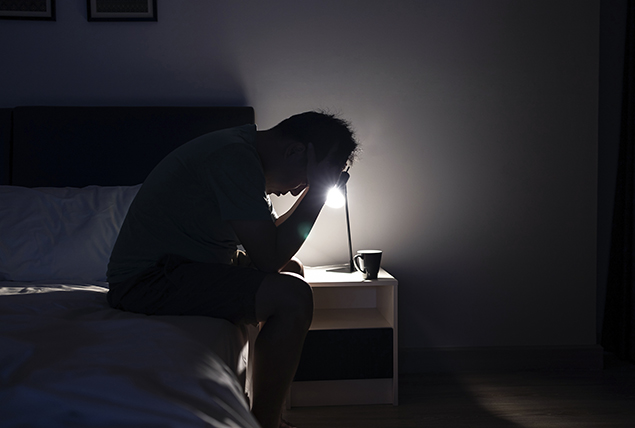More Severe ED Is Linked to Higher Risk of Depression and Anxiety

Erections are perhaps surprisingly complicated to some people. Proper blood flow and hormone levels are important, but so are arousal and state of mind.
There are physiological factors, but there are also psychological factors that impact your ability to get an erection, said Christopher C. Kyle, M.D., a urologist with the Oregon Urology Institute in Springfield.
"In patients who suffer from anxiety and depression, the psychological factors can play a large role," Kyle said.
Mental health problems, such as depression, anxiety and stress, have long been linked to erectile dysfunction (ED), or the inability to achieve or maintain an erection long enough to have sex.
Erectile dysfunction is common, impacting at least 30 million men in the United States, according to research estimates.
New research published in the journal BMC Psychology suggests that more severe ED is associated with a higher risk of anxiety and depression. The study also found that in addition to erectile dysfunction, certain other factors—education level, regular sleep, exercise—could increase the risk of anxiety and depression in people with ED.
About the study
The study was conducted in China, where ED impacts an estimated 50 percent of men. Researchers enrolled more than 500 participants between the ages of 18 and 60 who had mild to severe erectile dysfunction. The research team asked participants to fill out questionnaires about their lifestyle, education level, sexual behaviors and other habits, and rank themselves on a scale for anxiety and depression.
The researchers found about 38 percent of participants had anxiety and 65 percent had depression. Some 32 percent had both anxiety and depression. They also found participants with more severe ED were at greater risk of developing these mental health conditions.
According to their findings, certain characteristics and behaviors could help reduce the likelihood of people with ED experiencing anxiety and depression. For example, a higher education level was shown to help protect people with ED from developing depression and anxiety. So were healthy lifestyle habits, such as getting regular sleep and exercise.
"Our current findings are important today. It provides insights into the associated factors and prevalence of anxiety and depression, as well as coping strategies among ED patients," the researchers wrote.
What's the link between ED and mental health?
The relationship between mental health and erectile dysfunction is not fully understood, but experts believe the two can work in a vicious cycle. Anxiety and depression can precede ED, impacting someone's ability to feel desire and arousal by disrupting hormone levels and blood flow to the genitals.
"Depression and anxiety can accentuate the psychological factors that affect erectile dysfunction, even in people who have perfectly normal physiology without issues with blood flow," said Kyle, who was not involved in the study.
The opposite is also true. Erectile dysfunction can create emotional and mental health complications among people who don't typically experience psychological issues, he explained. A downward spiral may develop where erectile dysfunction leads to performance anxiety, which leads to more dysfunction, according to Kyle.
Complicating the issue further is the fact that many medications used to treat anxiety and depression have side effects that impact erections.
Manage the cycle of ED, anxiety and depression
As the Chinese research indicated, symptoms of anxiety and depression in some people with ED can be managed by engaging in certain behaviors, such as regular sleep and exercise.
"For ED patients with anxiety or depression, psychosocial interventions including cognitive and behavioral therapy, and different modalities [e.g., marital therapy, sexual skills training, psychosexual education] are recommended," the researchers wrote.
Kyle believes the first step toward resolving the problem is to talk about these issues with your partner.
"The first 'treatment' is communication," he said. "When men have trouble with an erection, they're embarrassed; there's a lot of shame. That causes them to withdraw from initiating sexual activity with their partners, and that can worsen anxiety and depression."
On the other hand, having a close connection with an intimate partner can alleviate symptoms, he said. It helps to reassure the partner they are not the cause of the problem. They need to know that what's happening is normal and very common.
After addressing the psychological element of ED through communication and strategies like therapy, there are a wide variety of treatments for ED that help with the physiological side of things, Kyle explained. These range from wearable devices that help stop the blood from leaving the penis to surgical treatment, injections and medications.
Kyle leaves people with erectile issues with an important piece of advice.
"There are a lot of ways to be physically intimate with a person that don't necessarily involve the penis," he said. "One of the other pieces of advice I give my patients is to not be so obsessed with the penis and how firm it is, or their ability to have penetrative intercourse.
"That takes a little bit of pressure off," Kyle said.
If psychological intervention improves feelings of anxiety or depression but erectile dysfunction persists, one of the newest ED treatments on the market can help. A wearable device free of the side effects of medication, Eddie® is an FDA-registered Class II medical device that can restore sexual function. Designed to treat erectile dysfunction and improve male sexual performance, its unique shape and fast-acting results allow you to treat your ED with more control.
With Eddie, you don't need to wait for a pill to kick in, use an awkward pump or subject yourself to painful injections. And in 2021 clinical trials, 93 percent of men who used Eddie reported increased confidence in their sexual performance.


















